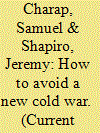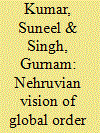| Srl | Item |
| 1 |
ID:
134486


|
|
|
|
|
| Summary/Abstract |
A more powerful China under the seemingly confident leadership of President Xi Jinping has committed to a more activist global policy. In particular, this commitment has influenced Beijing's policy towards UN peacekeeping operations, with a long-awaited decision to add combat forces to the engineering troops and police and medical units that have been features of its past contribution. In addition, Beijing has doubled the size of its contribution to the UN peace operations budget. This article explains why the UN is a key venue for China to demonstrate its ‘responsible Great Power’ status and expressed willingness to provide global public goods. The main explanatory factors relate to the UN's institutional design, which accords special status to China even as it represents a global order that promotes the sovereign equality of states. Moreover, there are complementarities between dominant Chinese beliefs and interests, and those contained within the UN system. Especially important in this latter regard are the links that China has tried to establish between peacebuilding and development assistance with the aim of strengthening the capacity of states. China projects development support as a contribution both to humanitarian need and to the harmonization of conflict-ridden societies. The Chinese leadership has also spoken of its willingness to contribute to peacemaking through stepping up its efforts at mediation. However, such a move will require much deeper commitment than China has demonstrated in the past and runs the risk of taking China into controversial areas of policy it has hitherto worked to avoid.
|
|
|
|
|
|
|
|
|
|
|
|
|
|
|
|
| 2 |
ID:
135222


|
|
|
|
|
| Summary/Abstract |
This year, the tragedies and outrages of the Ukraine crisis have dominated headlines and thinking about Western relations with Russia. There can be little doubt that the United States and its European allies and partners need a response to the Russian annexation of Crimea, to the destabilization of eastern Ukraine, to the separatists’ downing of a civilian airliner—and to the threat to global order that all of these actions
represent.
|
|
|
|
|
|
|
|
|
|
|
|
|
|
|
|
| 3 |
ID:
136646


|
|
|
|
|
| Summary/Abstract |
The global order is undergoing a churn and the general pointers forecast an era of a cataclysmic systemic change. The pronouncement of the “Rebalance to the Asia-Pacific”, indicating a shift in US strategic focus to Asia, has captured the imagination of the scholars and the analyst community alike. Within the prevailing nebulous and uncertain global architecture, this strategic recast by the dominant security provider has far-reaching implications. Considering the contextual underpinnings of various policy articulations and the geographic construct of this strategic reorientation, the maritime element would play a crucial role in this re-alignment of US strategic posture. This paper aims to deconstruct the maritime–military context of the US rebalance and draw out necessary implications for international, regional and Indian strategic calculus.
|
|
|
|
|
|
|
|
|
|
|
|
|
|
|
|
| 4 |
ID:
135146


|
|
|
|
|
| Summary/Abstract |
Rejecting the various ‘World Order Models’ being projected as a panacea for a lasting peace, Nehru visualised ‘World Union’ based on democratic principles to create an egalitarian social and economic order across the globe and to eliminate the recurring phenomena of conflict and tension which produce wars at regular intervals. The perceived ‘World Government’ could provide a platform to manage and eliminate the modern forms of warfare: ethnic conflicts, proxy wars, militancy, terrorism, etc., while accommodating and redressing the grievances and resentments of specific people across as well as within the borders of national units. A global legislature can provide the community of nations a uniform, codified and effective international legal order. The Nehruvian model which sought to create an egalitarian, ‘planned’ and ‘socialised’ world economic order by eliminating imperialism and colonialism in all forms and manifestations could be relevant to manage the global economic crisis and also for the development of underdeveloped world. A World Union based on democracy and freedom may protect individual and group rights against ethnic cleansings and genocides and may help to universalise the institution of democracy. A strong world government, suggested by Nehru, can control nuclear proliferation and save mankind from the scourge of nuclear war.
|
|
|
|
|
|
|
|
|
|
|
|
|
|
|
|
| 5 |
ID:
137033


|
|
|
|
|
| Summary/Abstract |
When collecting data, some observations will always be hard to confidently classify in accordance with stated definitions of war, civil conflict, or political violence. This research note draws on the experiences of the Uppsala Conflict Data Program in the last decade in managing such unclear cases. After explaining the difference between unclear and non-cases, I describe the data generating process and how this uncertainty is distributed over time in the data. This exercise reveals that the 1980s may have been more conflict-filled than the 1990s, challenging arguments about the stability of the bipolar global order as well as the sudden ‘rise’ of warfare in the immediate post-Cold War era. The final section suggests different ways that researchers may use existing information regarding unclear cases as a way to conceptualize the nature of civil strife without having to engage in additional data collection.
|
|
|
|
|
|
|
|
|
|
|
|
|
|
|
|